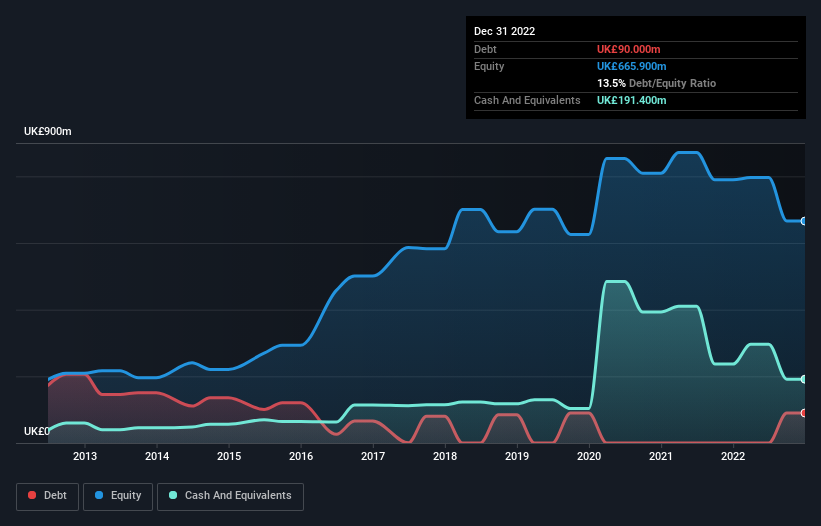- United Kingdom
- /
- Professional Services
- /
- LSE:HAS
These 4 Measures Indicate That Hays (LON:HAS) Is Using Debt Safely
Legendary fund manager Li Lu (who Charlie Munger backed) once said, 'The biggest investment risk is not the volatility of prices, but whether you will suffer a permanent loss of capital.' When we think about how risky a company is, we always like to look at its use of debt, since debt overload can lead to ruin. As with many other companies Hays plc (LON:HAS) makes use of debt. But the real question is whether this debt is making the company risky.
When Is Debt A Problem?
Generally speaking, debt only becomes a real problem when a company can't easily pay it off, either by raising capital or with its own cash flow. Ultimately, if the company can't fulfill its legal obligations to repay debt, shareholders could walk away with nothing. However, a more common (but still painful) scenario is that it has to raise new equity capital at a low price, thus permanently diluting shareholders. Of course, plenty of companies use debt to fund growth, without any negative consequences. When we examine debt levels, we first consider both cash and debt levels, together.
See our latest analysis for Hays
What Is Hays's Net Debt?
You can click the graphic below for the historical numbers, but it shows that as of December 2022 Hays had UK£90.0m of debt, an increase on none, over one year. However, it does have UK£191.4m in cash offsetting this, leading to net cash of UK£101.4m.

How Strong Is Hays' Balance Sheet?
We can see from the most recent balance sheet that Hays had liabilities of UK£969.9m falling due within a year, and liabilities of UK£250.8m due beyond that. Offsetting this, it had UK£191.4m in cash and UK£1.13b in receivables that were due within 12 months. So it can boast UK£96.2m more liquid assets than total liabilities.
This surplus suggests that Hays has a conservative balance sheet, and could probably eliminate its debt without much difficulty. Succinctly put, Hays boasts net cash, so it's fair to say it does not have a heavy debt load!
Another good sign is that Hays has been able to increase its EBIT by 23% in twelve months, making it easier to pay down debt. There's no doubt that we learn most about debt from the balance sheet. But ultimately the future profitability of the business will decide if Hays can strengthen its balance sheet over time. So if you want to see what the professionals think, you might find this free report on analyst profit forecasts to be interesting.
Finally, while the tax-man may adore accounting profits, lenders only accept cold hard cash. Hays may have net cash on the balance sheet, but it is still interesting to look at how well the business converts its earnings before interest and tax (EBIT) to free cash flow, because that will influence both its need for, and its capacity to manage debt. Over the last three years, Hays actually produced more free cash flow than EBIT. That sort of strong cash conversion gets us as excited as the crowd when the beat drops at a Daft Punk concert.
Summing Up
While we empathize with investors who find debt concerning, you should keep in mind that Hays has net cash of UK£101.4m, as well as more liquid assets than liabilities. And it impressed us with free cash flow of UK£151m, being 106% of its EBIT. So is Hays's debt a risk? It doesn't seem so to us. The balance sheet is clearly the area to focus on when you are analysing debt. But ultimately, every company can contain risks that exist outside of the balance sheet. For instance, we've identified 1 warning sign for Hays that you should be aware of.
When all is said and done, sometimes its easier to focus on companies that don't even need debt. Readers can access a list of growth stocks with zero net debt 100% free, right now.
Valuation is complex, but we're here to simplify it.
Discover if Hays might be undervalued or overvalued with our detailed analysis, featuring fair value estimates, potential risks, dividends, insider trades, and its financial condition.
Access Free AnalysisHave feedback on this article? Concerned about the content? Get in touch with us directly. Alternatively, email editorial-team (at) simplywallst.com.
This article by Simply Wall St is general in nature. We provide commentary based on historical data and analyst forecasts only using an unbiased methodology and our articles are not intended to be financial advice. It does not constitute a recommendation to buy or sell any stock, and does not take account of your objectives, or your financial situation. We aim to bring you long-term focused analysis driven by fundamental data. Note that our analysis may not factor in the latest price-sensitive company announcements or qualitative material. Simply Wall St has no position in any stocks mentioned.
About LSE:HAS
Hays
Engages in the provision of professional and skilled recruitment services in Germany, the United Kingdom, Ireland, Australia, New Zealand, and internationally.
Excellent balance sheet and good value.
Similar Companies
Market Insights
Community Narratives



